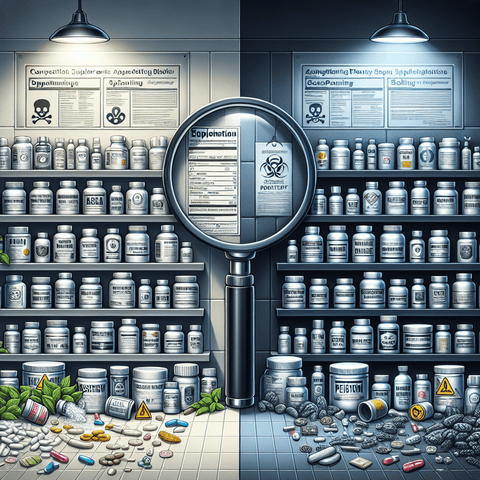Introduction
The global nutritional supplement market is booming. Valued at hundreds of billions of dollars and growing annually, it's no surprise that health-conscious individuals and wellness enthusiasts alike are bolstering their daily routines with vitamins, minerals, herbals, and specialty nutrients. From immune-boosting vitamin C to omega-3-rich fish oil, supplements have become a staple for supporting everyday health and wellbeing. However, this growing demand has also opened the floodgates for unscrupulous manufacturers and distributors to infiltrate the supply chain with counterfeit supplements.
Fake dietary supplements are not just a nuisance—they pose a legitimate health risk. With misleading labels, unknown ingredients, and potentially toxic substances, counterfeit supplements are more than a scam; they can harm your body and put your wellness goals in jeopardy. Whether you're shopping online or in-store, the threat is real and increasingly sophisticated.
As a consumer, staying informed is your first line of defense. By understanding how to spot fake supplements and knowing what red flags to look out for, you can make smarter choices and protect your health from potentially harmful products. This blog post is your guide to navigating the complexities of supplement authenticity. We'll cover the dangers of counterfeit supplements, how to identify them, where to shop safely, and how to ensure the products you purchase deliver the promised nutritional support. Whether you're exploring the benefits of vitamin C, vitamin D, or omega-3 supplements, product purity is non-negotiable.
Let’s explore how to equip yourself with the knowledge and tools required to avoid fake supplements and ensure the products you intake truly support your health goals.
Understanding Counterfeit Supplements in the World of Nutrition
Counterfeit supplements are fake or fraudulent products that are intentionally mislabeled with respect to identity or source. These products may contain incorrect or harmful ingredients, incorrect dosages, or may entirely lack any of the marketed active substances. The World Health Organization (WHO) reports that 1 in 10 medical products in low- and middle-income countries is substandard or falsified. Although supplements technically aren't medicines, they fall under the same broad category of health-related consumer goods—which means they're equally susceptible to fraudulent activity.
In the world of nutritional supplements, counterfeit products are specifically designed to imitate legitimate brands. Often produced and distributed without oversight, these fake goods exploit the credible appearance of trusted names with one goal in mind: profit. Since the supplement industry is less strictly regulated than pharmaceuticals in many countries, counterfeiters often exploit legal loopholes and limited quality control enforcement, particularly when selling through unverified online sellers or grey-market platforms.
The motivations behind producing counterfeit supplements are typically financial. By cutting costs—substituting high-quality ingredients with cheaper, potentially dangerous ones—counterfeiters can manufacture large volumes of fake capsules or tablets and market them with fake labels and packaging. With the average consumer unable to visibly distinguish real from fake, these products can be hard to spot.
High-profile recalls and public health scares further reveal the breadth of the issue. For example, several testosterone boosters and weight-loss products sold online were found to contain prescription-only or banned pharmaceutical drugs. These were often marketed as “all-natural” or “herbal” supplements.
The proliferation of counterfeit supplements erodes public trust and jeopardizes health. In this environment, consumer vigilance is more important than ever. Whether you're shopping for vitamin K to support bone and blood health, or magnesium for muscle and energy support, verifying a supplement’s authenticity is key.
The Truth About Fake Dietary Supplements and Their Hidden Dangers
Fake dietary supplements are more than just mislabeled or expired products—they’re deceptive formulations that can represent serious health hazards. These products may mislead consumers by manufacturing themselves with unlisted or unauthorized ingredients, copying popular designs, and using marketing language that mimics trusted brands. Often, they fall into categories that are in high demand, such as weight loss supplements, testosterone enhancers, multivitamins, and immune boosters.
The antioxidant properties of vitamin C or bone support benefits of vitamin D are among the top reasons people turn to supplements. However, these highly sought-after products are frequently the targets of counterfeiters. It’s not uncommon to find a widely advertised brand of vitamin C on an unknown website at a heavily discounted price—only to discover the product lacks the promised active ingredient or contains potentially harmful additives.
Fake supplements differ from expired or low-quality ones in several distinct ways. An expired supplement may simply have reduced efficacy, and a low-quality product may have questionable sourcing or poor absorption rates—but counterfeit products pose a far greater risk. They may contain:
- Unlisted pharmaceutical agents such as steroids, stimulants, or anti-depressants.
- Toxic substances like industrial-grade fillers or heavy metals.
- Microbial contamination stemming from unhygienic manufacturing environments.
- Zero active ingredients, providing no health benefit whatsoever.
Warning signs may be present on packaging. Check for blurry printing, inconsistent fonts, strange logos, and spelling errors—clear indications that the product has not undergone rigorous quality control. Similarly, watch out for packaging that lacks batch numbers, manufacturing dates, expiration dates, or GMP (Good Manufacturing Practice) certification labels. If any of these essentials are missing, the product may be counterfeit.
Online marketplaces are major contributors to the distribution of fake supplements. Third-party sellers on popular platforms may dilute or tamper with products without consumer knowledge. To stay safe, stick with authorized sellers such as Top Vitamine’s magnesium supplement collection, where product sourcing and third-party testing are top priorities.
Spotting these issues early is the key to maintaining your health and preventing the severe consequences of ingesting fake products. Now that we understand the threat, let's dive into how you can confirm a product’s authenticity before you buy.
Conducting a Supplement Authenticity Check Before You Buy
Before purchasing any nutritional supplement, it's essential to verify that it’s genuine. Fortunately, numerous tools and strategies can help you perform a supplement authenticity check and make safer choices.
1. Verify the Manufacturer: Visit the brand’s official website and cross-check the product listing. Most reputable brands will list their authorized sellers or retail partners. If you're buying from a distributor or third-party vendor, verify that they are listed as authorized resellers.
2. Look Up Batch Numbers and Certifications: Each supplement should carry a unique batch number, visible on the label or packaging. This allows traceability back to the manufacturing process. Certifications such as GMP (Good Manufacturing Practices), USP (United States Pharmacopeia), or NSF indicate that the product has been produced and tested under regulatory standards.
3. Use Product Verification Tools: Technological innovations have made it easier to verify authenticity. Some brands offer QR codes to scan with your phone, holographic seals, or serial numbers to input into their online database. Always make use of these technologies when available.
4. Third-Party Lab Testing: Reputable supplement providers often have their products tested by independent laboratories. Transparency is key; look for brands that make their Certificates of Analysis (COA) available. These documents validate the identity and purity of the supplement’s ingredients.
5. Research Customer Reviews: Honest feedback from other users can be a rich source of information. Be cautious of overly generic or excessively positive reviews, which can sometimes be fabricated. Look for in-depth feedback that references product quality, delivery condition, and packaging details.
6. Buy from Trusted Retailers: The safest way to ensure a product’s authenticity is by purchasing directly from trustworthy retailers like TopVitamine’s official vitamin D collection. These vendors prioritize third-party testing and transparency, reducing the risk of adulterated or counterfeit goods.
7. Beware of Red Flags: Avoid buying from websites that do not disclose company information, offer heavy discounts, have odd domain names, or fail to provide full ingredient transparency. Deals that seem "too good to be true" often are.
By following these steps meticulously, consumers can reduce their exposure to dangerous supplements and invest in their health wisely. Let’s now explore the real-life consequences of making the wrong choice.
Health Risks of Fake Supplements: What’s at Stake?
Fake supplements can cause a wide array of health problems, ranging from mild to life-threatening. Their composition is often unknown or confirms no standardization, making any associated health effects unpredictable and dangerous.
Toxic Additives: Some counterfeit supplements include illicit fillers, such as lead, arsenic, mercury, or industrial chemicals. These adulterants can accumulate in the body over time, leading to serious illnesses such as kidney failure, liver damage, or heavy metal poisoning. These effects may go unnoticed for months, only to culminate in drastic health deterioration.
Pharmaceutical Ingredients: Investigations have uncovered counterfeit supplements containing unapproved drugs including steroids, anti-depressants, and stimulants. For someone who is already on medication, ingesting unlisted pharmaceuticals may trigger harmful interactions, such as serotonin syndrome or cardiovascular events.
Allergic Reactions: Counterfeit supplements may include traces of allergens like gluten, soy, or peanuts. Without proper labeling, sensitive individuals have no opportunity to protect themselves, leading to allergic reactions that range from rashes to anaphylaxis.
False Sense of Nutritional Security: Perhaps most insidious is the psychological toll of believing you're ingesting quality vitamins and minerals—when in reality, your body is being deprived. This can prolong deficiencies, exacerbate existing health conditions, and undermine long-term wellness goals.
Real-Life Case Study: A widely reported case involved consumers in the EU purchasing an "herbal" supplement for weight loss, which was later found to contain sibutramine, a banned appetite suppressant linked to heart issues. Several hospital admissions and even fatalities were linked to the product before regulators traced the source.
These examples highlight why scrutinizing every supplement purchase is essential. For instance, if you’re turning to omega-3 DHA + EPA supplements to support brain and cardiovascular health, opting for verified, lab-tested sources ensures your peace of mind and physical wellbeing.
Identifying Fake Vitamins: Clues Hidden in Plain Sight
Spotting counterfeit vitamins often begins with the packaging and other sensory identifiers. Even the most well-disguised products will often leave behind telltale signs that reveal their illegitimacy. Here's how to recognize the clues hidden in plain sight:
1. Packaging Integrity: Authentic products maintain a high standard in print quality, label alignment, and seal security. Misspelled words, mismatched fonts, or blurry labels may indicate a fake product. Even slight color variations from the usual branding should be grounds for further investigation.
2. Pill Appearance and Texture: Legitimate vitamins have consistent color and texture. If you notice pills that are discolored, powdery, or sticky, proceed with caution. Counterfeits often fail to replicate the exact shape, coating, or embossing of the originals.
3. Smell and Taste: Most high-quality supplements have little to no distinct odor. A strong chemical or artificial smell could signal contamination or spoilage. Always cross-reference with your previous experiences and trusted brands you’ve used before.
4. Fake Labeling Tactics: Look out for non-compliant labeling, such as lack of dosage information, undefined health claims, or phrases like “miracle cure” or “guaranteed results.” These violate EU health regulations and are typically not found on legitimate supplements.
5. Verification Markings: Many manufacturers include barcodes, QR codes, or embossed logos. Scan these when possible. Lack of such identifiers or their removal is a red flag. Protective foam inserts, sealed lids, and tamper-proof holograms are signs of a well-manufactured product.
6. “Natural” and “Herbal” Misuse: Just because a label says “natural” or “herbal” doesn’t mean it’s legitimate. These terms are often used by counterfeiters to create a false sense of safety. Only buy products with ingredient transparency and verifiable certifications.
Armed with this knowledge, you’re better equipped to tell the difference between a legitimate supplement and a counterfeit replica. In the next section, we’ll focus on how to protect yourself in today's digital-first buying environment.



